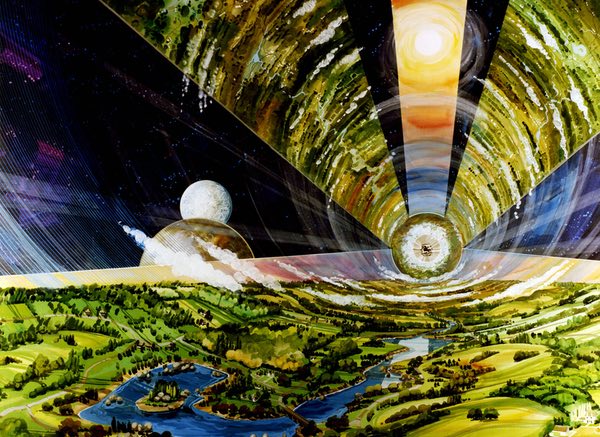A space-focused alternative to a Green New Dealby Taylor Dinerman
|
| Fortunately, such a vision exists, in the form of the idea that humanity will create a spacefaring civilization. |
Such language has raised concerns that efforts by the Green movement in Europe, or proposals like the Green New Deal in the United States, could force disastrous solutions on the public. It may not be enough to simply explain the harm that such programs would do, though. People who’re dissatisfied with the status quo need to hear something different and hopeful. An ambitious, alternative long-term vision for humanity is needed to provide a conceptual framework around which people can build an economy that does not require people to live in environmentally correct misery and poverty.
Fortunately, such a vision exists, in the form of the idea that humanity will create a spacefaring civilization. This will include settlements on the Moon and Mars and, perhaps more importantly, will create a new industrial model outside Earth’s atmosphere providing people with a stream of resources and products without having to pollute our planet’s ecosphere.
Such a change may seem far-fetched, but it is far more realistic that the promises of government jobs and rationing implied by the advocates of the Green New Deal. The building blocks are coming into place. One is low-cost access to space, being developed by Elon Musk’s SpaceX, Jeff Bezos’ Blue Origin, and others in China, Europe, and elsewhere who’ve woken up to the potential of reusable launch vehicles. Others are beginning to invest in prospecting for valuable resources on asteroids. Also, as part of lunar and Martian settlement plans, the idea of in situ resource utilization (ISRU) has taken hold. To power these projects, new types of nuclear power plants are being developed and, in some countries, the possibilities of space solar power are being explored.
Taken together, these elements form the basis for a new human economy, one that may eventually encompass the whole solar system. Such an economy would make Earth the “Garden Suburb,” where the vast majority of humans live in comfort and (hopefully) peace. Some people would work in space while many more would earn their living remotely managing space mining and manufacturing systems. With ample energy, either beamed down from orbiting solar platforms or from terrestrial versions of space-based reactors, fossil fuels would become largely obsolete without the need to outlaw them. Large-scale space solar power will principally be used to power space-based industry.
Last year, Jeff Bezos said this: “In the not-too-distant future—I’m talking decades, maybe a hundred years—it’ll start to be easier to do a lot of the things we currently do on Earth in space because we’ll have so much energy.”
Such a civilization would not answer all or even most of the ills that currently plague our human race. Prosperity and peace will not make people more spiritually fulfilled or politically satisfied, but they will help.
In her interview, Batho claims that two forces are confronting each other. She calls them the “Earthlings” and the “Destructors.” Her desire is to see the Earthlings, who she identifies as the political Greens, take control and forcibly consign the opposition to the dustbin of history. Her vision is one of unlimited power for her movement.
| Prosperity and peace will not make people more spiritually fulfilled or politically satisfied, but they will help. |
The “Garden Earth” movement has little need for political power, only enough to ensure that governments provide a decent framework for property rights and security. Government space agencies such as NASA can help to a limited extent, but as Musk and Bezos are showing, the private sector can do most of the heavy lifting, both literally and figuratively. The low-cost heavy-lift rockets that are now being built, like Musk’s Super Heavy/Starship and Bezos’ New Glenn, are the first of a new class of RLVs that will make access to space affordable and in ways we cannot now imagine. They will also change the human relationship with our environment.
Human ingenuity, when allowed to flourish, has a pretty good record of problem solving. As Glenn Reynolds likes to point out to people who’re nostalgic for a pre-industrial civilization: think dentistry.
Pessimism and envy may be hard-wired into our brains. Delphine Batho and her movement may succeed, at great cost, to temporarily prevent the humanization of the solar system, but one way or another it will happen.
Note: we are temporarily moderating all comments subcommitted to deal with a surge in spam.
